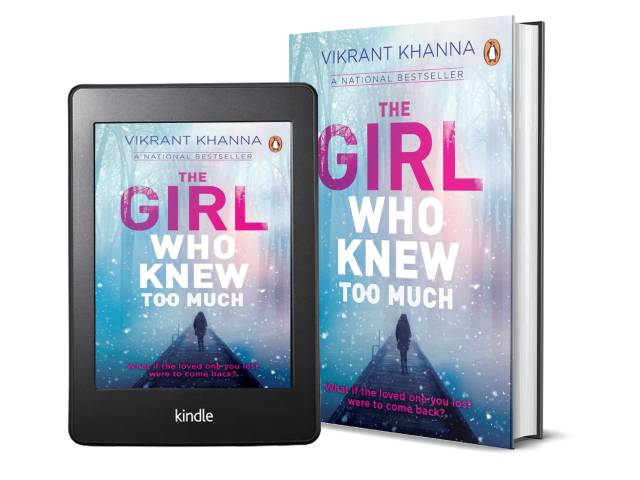We love reading thrillers.
We’ve mentioned it so many times that our regular readers already know it :).
| Book Title | : | The Girl Who Knew Too Much |
| Author | : | Vikrant Khanna |
| Published by | : | Penguin Random House India ( 14 April 2017) |
| # of Pages | : | 224 (Paperback) 178; 1607 KB (Kindle EBook) 294 Minutes (Audiobook) |
| # of Chapters | : | 46 |
| Purchase Link(s) | : |
|
That’s why the book The Girl Who Knew Too Much by Vikrant Khanna was on our list for a long time. Finally, from our team, I got a chance to read it. I found the book gripping in parts. If you love reading suspense thrillers that blend properly with emotions, then reading “The Girl Who Knew Too Much” will surely be an interesting experience for you.
This Is Here In For You
Cover Page:
Being a gateway to the virtual world explored within, the cover page is responsible for making the first impression of the book.
And, by nature, we are inclined towards beauty. So, an attractive cover page can surely lead a casual browser on the path of being a buyer or a reader.
Let us take a look at the cover page of this book.

The Girl Who Knew Too Much By Vikrant Khanna | Book Cover
As you can see, the cover page of this book looks really attractive at the first glance. A little girl is found coming or going on the mysterious path! It reflects the book title and even adds the mystery factor to the cover page.
The combination of blue and pink with black and white makes cover page look soothing.
I found it up to the mark.
The Plot:
To avoid as many spoilers as possible, let us take a bird’s eye view of the book plot.
The title of the book is very similar to a bestseller thriller that explores brutal and cunning plot. The book later was converted into a film also. So, it is obvious for a casual reader to think that: “this book might be following the same path”. It would be a wrong assumption, however.
If you look at the cover page of the book quite in detail, you will notice the tagline of the book:
What if the loved one you lost were to come back?
It gives a hint about the plot.
The book starts with a casual encounter of a young girl, sitting alone on a bench in a garden with a stranger. The stranger starts the conversation. Though initially reluctant, the girl opens up and joins the conversation. During the conversation, we come to know that the girl has lost her mother and his father, despite loving her so much and taking good care of her, is not able to spend much quality time with her. That makes a void in her heart. And, she feels dejected.
The stranger then tells her a story. A story of love, innocence, misadventures to lure the loved ones, seeing her getting along nicely with someone else, and…
The girl found the story interesting and wanted to hear more of it. One meeting in the garden is not sufficient for that. So, will they meet again? And, by the way, does that story have any link to the girl. Or was it just a story told to keep a kid happy?!
In this book, spread over 46 chapters, you meet: Akshara Malhotra (young girl), Harvinder (Harry), Shilpi Aunty (Akshara”s maid), Sahiba, Ginny, Siddharth, Mishi, Zephyrus, Asit, Vivek, Shikha, Diksha, Aashima, and others.
Views and Reviews:
The USP of the book, according to me, is its simple writing. The plot has chances for improvement. The second half could have been more convincing. A regular reader may have connected with it more in that case.
The characters are simple. And, the author hasn’t (rightly) tried to make them black or white. Rather, they have shades of gray. And, that is how we find people around us.
From the initial segment of the book, the author is able to grab the attention of the reader. A very few seasoned authors can do that. Vikrant must be appreciated for that.
Let me share a few interesting lines from the book, in the same regards:
It isn’t often that you see a little girl, all by herself, crouched on a bench in a remote corner of a park. I looked around. The park was moderately occupied for a Saturday evening—kids screaming with joy on colorful swings; oldies holding their walking sticks and padding slowly on the zigzag tracks; young couples hiding behind bushes, landing watchful kisses on each other—and yet, no one seemed to notice this girl.
We are bound to have our perceptions and notions. They often influence our analytical abilities and reasoning.
When seeing a little girl crying in the park, the protagonist tries analysing her. And, here are his thoughts:
I figured she was crying because her father probably refused to give her a toy or something. I knew these rich kids; they could never be happy. We had plenty of spoilt kids like her in this neighbourhood of south Delhi, who wanted nothing less than heaven on Earth.
This is what all of us usually do. And, the perception is not absolutely wrong. We’ve seen such cases in real life.
These lines also shows the life of rich kids and how their growing up is different than the people from middle or lower-middle class (economically, of course).
It also makes you think, “Does providing the kids what they want, mostly to fill the void of what we’ve starved for and didn’t get during our growing up year; or as a substitute of quality time we need to spend with them; a valid choice?”
It makes the book really thought-provoking and any emotional and logical fellow will find it quite interesting.
The book elaborates the innocence of a child, how curious they are, and how to respond to them properly. Here are some interesting lines in that context:
‘Akshara Malhotra.’
‘And my name is Harvinder,’ I said. ‘But you can call me Harry.’
‘Why should I call you Harry if your name is Harvinder?’
I sputtered a quick laugh. ‘Because that’s my nickname. I like it. Don’t you have a nickname?’
These lines reminded me of – The Kindergarten Cop – an interesting action-comic movie starring Arnold Schwarzenegger.
Love – the real magic known to us, has a very important place in every life. Its presence or absence changes the direction of life.
We can say that this book has “love” as a central character. Here are some interesting lines about love mentioned in the book:
I always thought love was a game. You got to win it. But love is not a game. Love is sacrifice. Love is letting go. And above all, love is dreaming the impossible, like bringing back a dead man
When you truly love someone, you are always talking to yourself. Second-guessing yourself. Doubting yourself.
… love doesn’t age with us. It remains fresh and radiant whatever age we find it in.
And that’s why the book clearly says:
‘It’s the story of a girl named Sahiba, the love of her life and a little bit of magic.’
If I had to quote only one line from the book, I would probably settle for the following line that is so deep about analyzing humnan psyche.
I think the overly optimistic people are a little delusional. They keep feeding lies to themselves consciously till they truly begin to believe that it is the truth.
These quotes must have given you a fair idea about the quality of writing and what you should expect from the book.
Summary:
In summary, it is a book with strong characters focused on emotions and psyche. It is a nice read for all age groups. The initial segments had raised the bar of expectations for me. So, I think the second half and conclusion could have been better.
ThinkerViews Rating:
Around 7 stars out of 10.
Quick Purchase Links:
- Buy - The Girl Who Knew Too Much by Vikrant Khanna - Paperback - Amazon IN
- Buy - The Girl Who Knew Too Much by Vikrant Khanna - Kindle EBook - Amazon IN
- Buy - The Girl Who Knew Too Much by Vikrant Khanna - Audiobook - Amazon IN
- Buy - The Girl Who Knew Too Much by Vikrant Khanna - Paperback - Amazon US
- Buy - The Girl Who Knew Too Much by Vikrant Khanna - Kindle EBook - Amazon US
- Buy - The Girl Who Knew Too Much by Vikrant Khanna - Audiobook - Amazon US
Over To You:
If you already have read the book do share your remarks and thoughts via comments below. Does this review help you in making your decision to buy or read the book? Do not forget to share this article with your friends over various social networks. Please follow/subscribe us on various Social networks like Twitter, Facebook, YouTube, Spotify, Amazon Prime Music, Audible, and others. And yes, you may like to subscribe to our RSS feeds to get latest updates for the site to land right in your mail box.
 ThinkerViews – Views And Reviews Personal views and reviews for books, magazines, tv serials, movies, websites, technical stuff and more.
ThinkerViews – Views And Reviews Personal views and reviews for books, magazines, tv serials, movies, websites, technical stuff and more.



